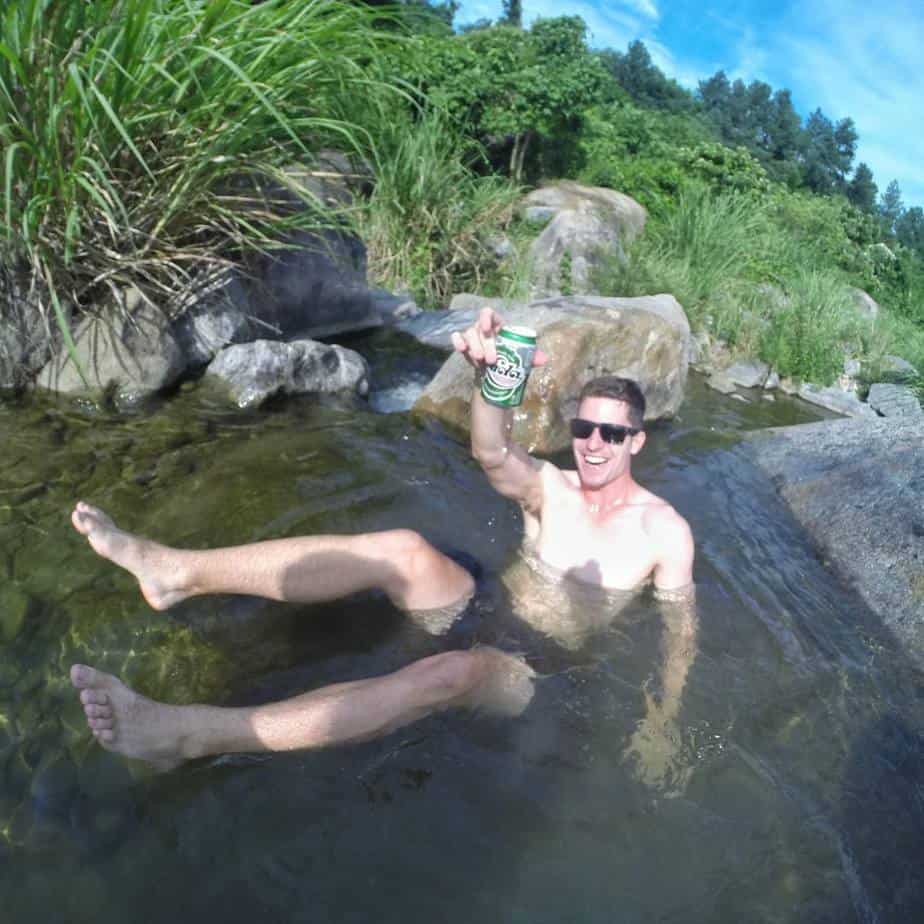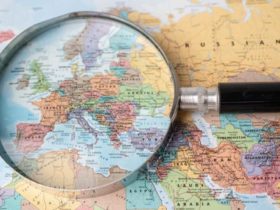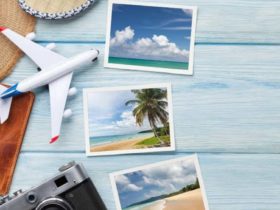Note: This post may contain affiliate links which means if you click on a link and purchase an item, we will receive an affiliate commission at no extra cost to you.
This is chapter 14 of an 18-part series about digital nomading and location independence. To see all of the other chapters, click here!
For female specific posts, scroll down to the bottom of this post.
Having visited more than 35 countries in my lifetime and after spending nine months traveling through the Asia Pacific region, I have extensive experience staying safe while venturing abroad. I’ve put together a list of essential tips to help you stay safe in foreign countries.
Hope you find these guidelines helpful–enjoy your travels and be careful out there!
Table of Contents
1. Check Government Warnings Before Traveling
Before traveling to an overseas location, make sure the area you’re visiting is safe and recommended for travelers. The Canadian government is a recommended source of information and provides detailed travel advisories on its website. It should be noted that the U.S. State Department does not generally provide detailed safety warnings, and I do not recommend using it as a reference point.
2. Get Recommended Vaccinations Before Leaving
Many countries around the world require specific vaccinations in order to enter, and there’s generally a good reason for it. The Canadian Government has a detailed guide on what vaccinations you should get for any country around the world. If you’re in Canada, Summit Travel Health (www.summittravelhealth.com) has 10 locations in Toronto and Montreal and is a convenient and reliable source for your vaccination needs.
3. Google “Popular Local Scams in X Country” Before Arriving
Some countries and cities are notorious for specific scams or pickpockets. By knowing what scams to expect in a given place, you can prepare yourself and spot warning signs before anything bad happens. This is something that I do consistently, especially when I travel to a new region of the world.
4. Make Sure To Research Whether You Can Drink The Water
One of the easiest ways to get sick is to drink water that you shouldn’t. If you’re from a country like the U.S. or Canada, where you’re habitually used to rinsing your toothbrush with water, you need to be extra careful. A little known fact is that Steve Jobs almost died in India the year before he started Apple because he got dysentery from drinking tap water.
5. Be Wary of Strangers
In most Asian countries, people are not normally friendly to strangers. If someone approaches you on the street, you should be extremely wary because they probably want to sell you something or possibly scam you. Yes, there are some generally curious and harmless strangers, but it can be nearly impossible to figure out people’s motives until it’s potentially too late. It’s ok to be standoffish and it’s also okay to be friendly–just be careful and aware of your surroundings either way.
6. Try To Blend In
If you attract attention with your appearance as a tourist, you’re making yourself a target. I recommend you leave jewelry, watches and other nice or flashy accessories at home–especially if you’re in a developing country. I travel with a plain looking bag and make an effort to dress in a way that doesn’t attract too much attention. It’s always better to stay under the radar if you can.
7. Don’t Be Afraid To Say No
When I first started traveling, I would take the time to answer strangers’ questions such as “where are you from?” “Where are you going?” “What is your name?”. That was, until I realized that most of these questions were icebreakers before the person tried to sell me something. I’ve learned to say “no thank you” or wave people away with my hand if I sense that is their intent. It is well within your right to not share information with strangers–don’t feel bad about keeping to yourself.
8. Follow The Locals
If you’re in a place for an extended period of time, making a local friend can help you a tremendous amount if you want to avoid getting sick, getting scammed, or generally avoid other pitfalls you might not be aware of. If the locals tell you to avoid eating street food (as they told me in Bangalore, India), then don’t eat street food. If you aren’t sure how to safely cross the street, watch the locals or even walk right next to them to be extra safe. In essence, the locals know best, so ask them questions and follow in their footsteps (especially when crossing a busy street!).
9. Be Smart In Busy Areas
When you’re on a train, in a busy market, or in another area where there is a lot of human activity, make sure to be smart with your belongings and keep your head on a swivel. I frequently walk with my hands in my front pockets so that it’s impossible for thieves to take my phone or wallet from me. For women carrying handbags, be sure to hold them close to your body and hold on to the strap with one or both hands. Thieves prey on people who aren’t paying attention, so be aware of your surroundings, keep your phone close to you, and don’t get distracted.
10. Get Travel Insurance
Travel insurance is a critical investment when traveling abroad because it covers you in case of medical emergencies, plus it covers lost or stolen baggage. As someone who has lost a bag and visited hospitals abroad, I definitely recommend playing it safe in this regard. World Nomads is the most popular travel insurance and is my personal recommendation.
11. Buy A Local SIM Card At Your Destination
If you have an active cell phone, you’re significantly safer while traveling because you’re able to phone for help, look on a map to see if the driver is taking you on the correct route, and Google potential scams to avoid them in real-time. I narrowly avoided a scam in Bangkok last year because I googled the “Lucky Buddha Temple” that the driver was taking me to and found out that it wasn’t a real temple. Pro Tip: Bring an unlocked cell phone and get a SIM card when you arrive at the airport – it’s usually about 70-90% cheaper than purchasing international data.
12. Use Transportation Apps (Such As Uber) Whenever Possible
When you use a transportation app like Uber, Grab (in SE Asia), Go-Jek (in Indonesia), or Ola (in India), you’re significantly safer because the ride is tracked and the driver is being held accountable by the company. It’s the same principle as buying an item on Amazon versus from a random person in a Wal-Mart parking lot. Transportation apps also tend to be much cheaper because drivers won’t be able to charge you “tourist” prices.
Bonus: Safety Tips For Women! (By Eva Gutierrez)
If you’re a female and wondering if it’s safe for you to travel the world alone, the answer is yes! There are thousands of solo female digital nomads backpacking the world as we speak.
Here’s what they’re doing to make sure they stay safe (for the record, men can take this same advice for traveling safely as a solo digital nomad):
- Have somebody back home accountable for you when you land in a new country.
- Tell them when your flight arrives, the hostel/Airbnb address that you’re going to directly after, how you are getting there (taxi, hostel shuttle, etc.) and approximately how long it will take you to get there.
- Have somebody accountable for you for short term travel trips.
- Note: this doesn’t have to be the same person. If you’re taking a weekend trip to Ubud, Bali from Canggu, tell someone that you’ll be leaving on Friday and coming back on Monday. Tell them who you’re going with and a loose plan of what you are doing while you’re there.
- Buy travel tickets (flights, buses, trains) that leave and arrive during the day time.
- Avoid arriving to a new city or country alone when the sun is down.
- Optional: Carry a pocket-sized pepper spray with you.
- These are hand held, pepper spray key chains that can be attached to your backpack and carried around with you everywhere you go.
- Be hyper aware of your surroundings.
- Being aware of who is around you or potential dangers is always something that should be on a digital nomad’s mind. If you’re in a new country, you should always be hyper aware of how you can avoid any dangerous situations and if you need to leave a location to make sure you do so.
- Be confident.
- If you’re walking down the street alone and there is somebody ahead of you walking in your direction (and acting normally), look them in the eyes and acknowledge them as they get closer. You want to show that you’re confident and in turn, not someone somebody with a bad agenda wants to mess with. This advice is situational—if you see somebody with clearly bad intentions walking towards you, use your pepper spray and/or run. For example, the time to use this approach is if you are walking down the street at night alone and somebody is walking down the street towards you. Look them in the eyes as you are about to pass each other and then nod or smile as they walk past you. The idea is to make sure they know you acknowledge them and are aware of their presence and what they look like.
- To this point– don’t look lost. Using a GPS app to find your way while walking is not only essential, but it will give you confidence that you know where you are going and won’t look like a vulnerable tourist.
Keep Reading: Click here to read Chapter 14: How To Meet People When You Move To A New City










Leave a Reply
View Comments